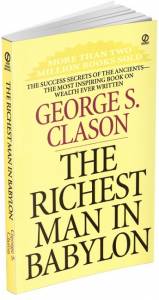The crisp fall air may put you in mind of getting back to the budget after a summer slide. No better time to hit the books.
There is no end to niche money books out there specializing in everything from student debt to retirement saving to investing.
But for those who are hankering for a big picture view on your money, here are our picks for personal finance life changers:
“The Total Money Makeover” by Dave Ramsey
 Once you start talking to people who have “gotten on track” with their money, it’s amazing to hear how often people talk about the impact “The Total Money Makeover” had on their lives.
Once you start talking to people who have “gotten on track” with their money, it’s amazing to hear how often people talk about the impact “The Total Money Makeover” had on their lives.
This action-oriented bootcamp for your financial life isn’t so much aimed at your money as it is at your behaviors involving money. Ramsey, a folksy radio host who, after going broke in his late 20’s, built an industry around his books and advice, admits in the book’s preface there’s nothing new here. It’s just that he’s offering financial principals from a behavioral approach.
He’s confident, he writes, that you understand the numbers. The hard part is getting you to do something about them. Actions that encourage momentum and confidence (like his controversial “debt snowball” advice to pay off the debt with the smallest balance first, as opposed to the one with the highest interest rate) have made this a down-to-earth, nonjudgmental plan that has worked for millions of people.
Who will love it: People who don’t know where to start with their money, are in debt or are without established financial habits.
Who will find it annoying: Anyone looking for investing tips and people allergic to down-home sayings like, “Even a turkey can fly in a tornado,” and biblically and spiritually-based advice.
“I Will Teach You To Be Rich” by Ramit Sethi
Like Dave Ramsey, Ramit Sethi also takes a behavioral approach to getting you off your duff and taking financial action in your own life. But while Ramsey is “common sense dad,” Sethi is more “outraged roommate.” Like when he says, “Listen up, crybabies: This isn’t your grandma’s house and I’m not going to bake you cookies and coddle you. A lot of your financial problems are caused by one person: you.”
He thinks you’re missing the point with your hyper-focus on stock picks and market risks, when meanwhile you’re still throwing your money at fees on your bank account. He suggests a budget broken down into four parts: fixed costs, savings, investments, and guilt-free spending money. He also recommends automating as much of your financial life as possible so you don’t have to decide every two weeks how much to put in your savings account.
The book lays out actionable steps organized in a six week program that includes setting up your credit cards to your advantage, working to find no-fee bank accounts, opening 401(k) and investment accounts, organizing your spending and automating as much as possible.
Who will love it: People who, like Sethi, like to get right to the point and don’t suffer fools.
Who will find it annoying: People who find a bro-y tone tiresome.
“The Richest Man in Babylon” by George S. Clason
 Humanities majors, rejoice! There is a personal finance book for you: “The Richest Man in Babylon,” written in 1926 by a Midwestern publisher, is a series of narrative parables on money basics that still ring true today.
Humanities majors, rejoice! There is a personal finance book for you: “The Richest Man in Babylon,” written in 1926 by a Midwestern publisher, is a series of narrative parables on money basics that still ring true today.
The book is written as stories that the “richest man in Babylon” tells to two hard-working men who don’t have any money. The timeless principles include the advice to pay yourself first (set aside your own cut from your paycheck, and then dole out the rest for your bills and expenses).
The book also reveals, through stories, how to make your money work for you, how to find good financial advice, and that you should continually live below your means. Nothing new or groundbreaking here, but the stories may help you to remember the advice.
Who will love it: People who want a little story and character with their substance.
Who will find it annoying: People with no patience for the pageantry of prose and just want the facts.
Read more via CNNMoney



